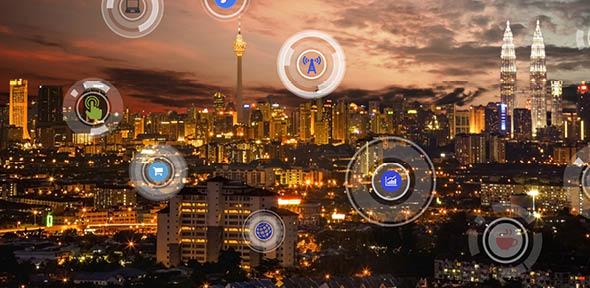
Submitted by Angela Walters on Wed, 19/02/2020 - 16:15
CDBB’s Digital Twin Hub is establishing and bringing together stakeholders in the digital twin space to create a collaborative web-enabled community to drive learning and accelerate progression through shared experience. Samuel Chorlton, DT Hub Chair, reflects on making headway and identifying next steps.
This year will see significant steps made in building the Digital Twin (DT) Hub community. I’m excited by recent progress at the DT Hub in readiness for the next phase of activity that invites wider engagement with the community. This marks a milestone and one worth celebrating. Discussions with first wave members have been dynamic and the recent DT Hub Breakfast event, the first in a series of workshops – with owners and operators have provided valuable insight into areas where the DT Hub can optimise its support to deliver the greatest benefit.
The first area, or ‘theme’, identified to meet the needs and priorities of the DT Hub community will be Testing Digital Twin Concepts. Exploring this foundational requirement as a collaborative community will support members to increase common understanding related to digital twin definitions and concepts, and test and refine this thinking within specific use cases and projects where there is potential to deliver significant value. Clear approaches to concepts and definitions of digital twins are key to supporting increased scale, complexity and interoperability on the road to a National Digital Twin – an ecosystem of connected digital twins, based on secure resilient data sharing and informed by shared values. This process of classifying digital twins and their constituent elements builds on the foundational definitions and guiding values offered by the Gemini Principles to enable alignment on the approach to information management across the built environment.
The value of sharing insight and collective learning was made clear at the DT Hub Breakfast event, where a number of digital twin owners came together to discuss the main challenges experienced on their digital twin journey. Initial discussion focused on skills shortages and establishing standards, and the potential benefits to be delivered from a digital twin. The meeting was also an opportunity to learn from the frontier of the digital twin space when Paul Clarke CBE, Chief Technical Officer at Ocado and a champion of the DT Hub, shared 20 years of experience building and developing the organisation’s technology platform and state-of-the-art automated warehouse system where “physical and digital worlds collide”. The next phase of Ocado’s technological development will see the building of a number of Living Labs to explore future autonomy and the intersection with drones and robots, smart infrastructure and smart services – an area requiring national catalysts (including CDBB’s National Digital Twin programme) to be able to maximise opportunity at a broader scale.
In addition to working with owners, we are engaging with the wider digital twin market to establish whether there is alignment among the supply chain and, as with engagement with digital twin owners, identify topics of interest and concern. As part of this scoping exercise the first in a series of Supply Chain Workshops took place in London. The workshop provided participants the opportunity to learn more about the CDBB National Digital Twin programme, hear about best practice, identify areas of opportunity, challenge and risk, and share feedback and recommendations to build the DT Hub digital twin community. Participants from the first workshop called for a collaborative approach, common foundations and consistency across the digital twin space. The need to identify a clear picture of the supplier’s offer was highlighted as was requirement for digital competency and skills. The principal challenge identified was data interoperability and the pressing need for standards to define the resolution of data, data fluency and a contractual framework for data.
Our digital twin community is growing as the benefits of collaborating towards a shared goal of better decision-making leading to financial savings and improved performance and service are increasingly recognised. The DT Hub will continue to engage with organisations from the DT market to support growth of the web-enabled community. There are more workshops and events planned and we welcome input from both owners and operators as well as suppliers of digital twin technology and services. An initial ‘supplier horizon scanning’ exercise to provide a better understanding of where suppliers are focusing innovation and what their value propositions are will continue to evolve this year; in time this information will help digital twin owners to identify and anticipate what opportunities are on the horizon. It is intended to reflect the rapid pace of innovation within the digital twin supplier market to be of value to DT Hub members as our community grows, and consider the realisation of the value proposition from an evidenced position.
We are currently planning our next DT Hub event in collaboration with the Open Data Institute, The Alan Turing Institute for the end of March. This workshop will further support the development of digital twins concepts and definitions and aims to share and consult participants on a first set of proposed DT definitions, concepts and models to seek alignment and consistency. I look forward to events like these that continue to open our engagement more widely to include organisations both big and small and across a diverse number of sectors to help inform the DT Hub agenda and best support the community it serves, delivering shared benefits and realising the potential of digital twins.
